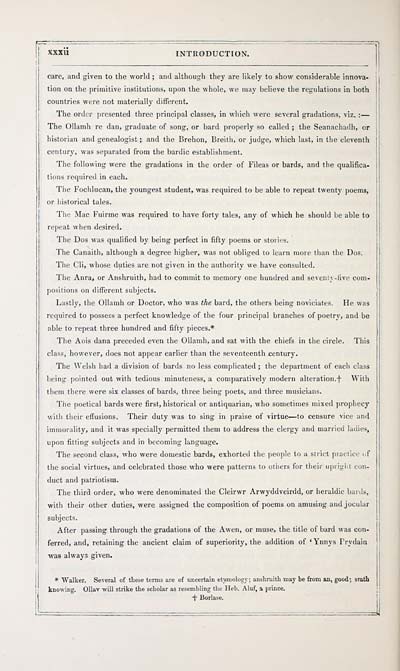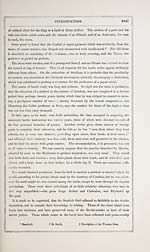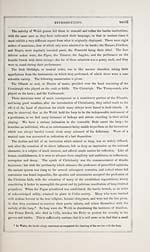Blair Collection > Sar-obair nam bard gaelach, or, The beauties of Gaelic poetry, and lives of the Highland bards
(42)
Download files
Complete book:
Individual page:
Thumbnail gallery: Grid view | List view

INTRODUCTION.
care, and given to the world ; and althougli they are likely to show considerable innova-
tion on the primitive institutions, upon the whole, we may believe the regulations in both
countries were not materially different.
The order presented three principal classes, in which were several gradations, viz. : —
The Ollamh re dan, graduate of song, or bard properly so called ; the Seanachadh, or
historian and genealogist ; and the Brehon, Breith, or judge, which last, in the eleventh
century, was separated from the bardic establishment.
The following were the gradations in the order of Fileas or bards, and the qualifica-
tions required in each.
The Fochlucan, the youngest student, was required to be able to repeat twenty poems,
or liistorical tales.
Tlie Mac Fuirme was required to have forty tales, any of which he should be able to
repeat when desired.
The Dos was qualified by being perfect in fifty poems or stories.
The Canaith, although a degree higher, was not obliged to learn more than the Dos.
The Cli, whose duties are not given in the authority we have consulted.
The Anra, or Anshruith, had to commit to memory one hundred and seveni\-(ivo com-
positions on different subjects.
Lastly, the Ollamh or Doctor, who was the bard, the otliers being noviciates. He was
required to posse£s a perfect knowledge of the four principal branches of poetry, and bo
able to repeat three hundred and fifty pieces.*
The Aois dana preceded even the Ollamh, and sat with the chiefs in the circle. This
class, however, does not appear earlier than the seventeenth century.
The Welsh had a division of bards no less complicated ; the department of each class
being pointed out with tedious minuteness, a comparatively modern alteration. f With
them there were six classes of bards, three being poets, and three musicians.
The poetical bards were first, historical or antiquarian, who sometimes mixed prophecy
with their effusions. Their duty was to sing in praise of virtue — to censure vice and
immorality, and it was specially permitted them to address the clergy and married ladies,
upon fitting subjects and in becoming language.
The second class, who were domestic bards, exhorted the people to a strict practice i^f
the social virtues, and celebrated those who were patterns to others for their upriglit con.
duct and patriotism.
The third order, who were denominated the Cleirwr Arwyddveirdd, or heraldic banls,
with their other duties, were assigned the composition of jjoeins on amusing and jocular
subjects.
After passing through the gradations of the Awen, or muse, the title of bard was con-
ferred, and, retaining the ancient claim of superiority, the addition of ' Ynnys Prydain
was alway; given.
* Walker. Several of these terms are of uncertain etvmology; anshruith may be from an, good; srath
knowing. Ollav -will strike the scholar as resembling tlie Heb. Aluf, a prince,
•f* Borlase,
care, and given to the world ; and althougli they are likely to show considerable innova-
tion on the primitive institutions, upon the whole, we may believe the regulations in both
countries were not materially different.
The order presented three principal classes, in which were several gradations, viz. : —
The Ollamh re dan, graduate of song, or bard properly so called ; the Seanachadh, or
historian and genealogist ; and the Brehon, Breith, or judge, which last, in the eleventh
century, was separated from the bardic establishment.
The following were the gradations in the order of Fileas or bards, and the qualifica-
tions required in each.
The Fochlucan, the youngest student, was required to be able to repeat twenty poems,
or liistorical tales.
Tlie Mac Fuirme was required to have forty tales, any of which he should be able to
repeat when desired.
The Dos was qualified by being perfect in fifty poems or stories.
The Canaith, although a degree higher, was not obliged to learn more than the Dos.
The Cli, whose duties are not given in the authority we have consulted.
The Anra, or Anshruith, had to commit to memory one hundred and seveni\-(ivo com-
positions on different subjects.
Lastly, the Ollamh or Doctor, who was the bard, the otliers being noviciates. He was
required to posse£s a perfect knowledge of the four principal branches of poetry, and bo
able to repeat three hundred and fifty pieces.*
The Aois dana preceded even the Ollamh, and sat with the chiefs in the circle. This
class, however, does not appear earlier than the seventeenth century.
The Welsh had a division of bards no less complicated ; the department of each class
being pointed out with tedious minuteness, a comparatively modern alteration. f With
them there were six classes of bards, three being poets, and three musicians.
The poetical bards were first, historical or antiquarian, who sometimes mixed prophecy
with their effusions. Their duty was to sing in praise of virtue — to censure vice and
immorality, and it was specially permitted them to address the clergy and married ladies,
upon fitting subjects and in becoming language.
The second class, who were domestic bards, exhorted the people to a strict practice i^f
the social virtues, and celebrated those who were patterns to others for their upriglit con.
duct and patriotism.
The third order, who were denominated the Cleirwr Arwyddveirdd, or heraldic banls,
with their other duties, were assigned the composition of jjoeins on amusing and jocular
subjects.
After passing through the gradations of the Awen, or muse, the title of bard was con-
ferred, and, retaining the ancient claim of superiority, the addition of ' Ynnys Prydain
was alway; given.
* Walker. Several of these terms are of uncertain etvmology; anshruith may be from an, good; srath
knowing. Ollav -will strike the scholar as resembling tlie Heb. Aluf, a prince,
•f* Borlase,
Set display mode to: Large image | Transcription
Images and transcriptions on this page, including medium image downloads, may be used under the Creative Commons Attribution 4.0 International Licence unless otherwise stated. ![]()
| Early Gaelic Book Collections > Blair Collection > Sar-obair nam bard gaelach, or, The beauties of Gaelic poetry, and lives of the Highland bards > (42) |
|---|
| Permanent URL | https://digital.nls.uk/81868372 |
|---|
| Description | A selection of books from a collection of more than 500 titles, mostly on religious and literary topics. Also includes some material dealing with other Celtic languages and societies. Collection created towards the end of the 19th century by Lady Evelyn Stewart Murray. |
|---|
| Description | Selected items from five 'Special and Named Printed Collections'. Includes books in Gaelic and other Celtic languages, works about the Gaels, their languages, literature, culture and history. |
|---|

